washington—When I first moved to Toronto from the United States in the early 1990s, I loved watching local Buffalo news. Delightfully, it was always bad news. Murders! Arsons! Racial inequities! Limited garbage pickup! Every social pathology of American life there was to ridicule could be enjoyed weeknights at six on Buffalo’s Channel 7 News. A few years later I began regular visits to Washington, DC, to shoot a documentary film on Ethiopian refugee musicians. DC, I thought, was Television in Tonawanda all over again, the most extreme and cartoonish bad traits of American society, swelling and inflamed, around Capitol Hill, the Monument, the Mall. Schools, libraries, and hospitals closing. The mayor, Anthony Williams, doing anything, anything, for baseball. The middle class decamping every day at five o’clock for Maryland and Virginia. The upper class protecting itself with private security guards.
George W. Bush’s second Inauguration Day has just passed, slapped onto DC like a rent increase. The White House broke with tradition this year by asking the city to pay for inauguration security out of its homeland security fund, instead of making a special appropriation as past administrations have done.
DC has enough problems to pay for. It reminds me of Jeffrey Frank’s comment about Washington in The New Yorker back in 2002: “Its crime rate is high, its culture is iffy, and its weather is so oppressive that, in the years before air conditioning, some diplomats got hardship pay.” Other American cities, over the past decade, tamed their felony rates and deodorized their downtowns; Washington has had no such makeover. While the pawnshops and gun shops of 125th Street in Harlem have given way to Blockbuster, Krispy Kreme, and a Body Shop—not as in stripped car parts, but as in cucumber moisturizers and coupons off Mommy’n’Me Gymnastics—Washington is still plagued by crime, and no one around Capitol Hill, the Monument, or the Mall is expected to give a damn.
DC is a solidly Democratic town, a largely secular city at the gateway to the Bible Belt, a black city within sight of the Fairfax Hunt Club, a pro-choice city in a country whose heartland wants to obliterate Roe v. Wade. It’s a place that remains defiantly anti-war while filled with servicemen in fatigues; a place where immigrants make up the fastest-growing demographic while Homeland Security choppers hover idly overhead. The posse of Texas Republicans that came into town with George W. Bush’s first inauguration are seen as a kind of occupying army. Washington’s local residents despise them, resent them, hold them responsible for the Iraq war, and at the same time hunger for their money.
After the election, I spent a day driving around with my friend Tekle, an Ethiopian saxophone player, in his cab. Tekle was shaken. “When we come here,” he told me, “we have big expectations. We want to do well for our children. You know? And here we are, DC! Silver Spring! We love our children like crazy, we care for them like crazy, we feed them like crazy, and now we get to see them go to Iraq and get chop-chopped into kitfo.”
(Kitfo is raw chopped steak, served at the Ethiopian restaurants that have become trendy places to eat in Washington. You wrap it quickly in injera bread and stuff it down, trying to forget that it’s a bloody, oozing thing.)
Washington may be a wartime city these days, but it’s still mainly a Southern one. More Southern, in its way, than Nashville or Austin or Atlanta: not just hot and humid, but segregated. Tekle and I drove through the city. White Washington is K Street near Dupont Circle, up Connecticut Avenue, past luscious Rock Creek Park. White Washington is Georgetown, and surrounding Embassy Row—rows and rows, really, of gigantic imitation schlosses and minarets and palazzos where elite kleptocrats from many lands, from Argentina to Zimbabwe, celebrate a continual architectural dress-ball costume party at their citizenry’s expense.
White Washington is the world capital of guys with custom-made suits and insured briefcases, barrelling around, Green Zone-style, in imitation Humvees; of women with Patty Duke hair; of Mercedes squadrons with diplomatic plates—and diplomatic immunity, should they mow over one of the black nannies pushing strollers uphill. Black Washington is everywhere else, its corner stores plated with armour and bulletproof Plexiglas, its apartments without air conditioning.
Like any self-respecting Southern town, as well, Washington has its Biblical plagues. Last spring, a swarm of locusts, or cicadas, flew into faces, buses, bustlines, my rented car’s windshield, littering the pavement, reducing each of us to the righteous disgust of a preacher in a Flannery O’Connor novel. The locusts were big enough to cast individual shadows, to have facial expressions. They crunched loudly underfoot.
But I came home. Home, to Toronto’s own social pathologies, and its once-every-two-weeks garbage pickup. It began to dawn on me that Washingtonians really aren’t that different, that Washington itself really isn’t that alienating. Washington’s mayor is helpless before the U.S. national government, the same way Toronto’s mayor, David Miller, is helpless and empty-handed before ours. The American federal government bullies local DC residents, much as it does the rest of the world; DC residents feel just as powerless as those of us outside the Empire. The licence plates actually read, “Taxation without representation.” Washington itself has no vote in Congress. Instead, Congress simply owns it. “We live with helplessness and hopelessness,” Kathryn Sinzinger, editor and publisher of DC’s Common Denominator magazine, told me. “Congress can come in and, in an instant, cancel out everything our elected city council and elected officials do.” Helplessness and hopelessness? Familiar overtones of Canadianismo during the fall Bush visit?
Since September 11, roadblocks, closed streets, choppers, and Secret Service agents have become part of the city’s downtown landscape. And the state of siege continued with the election, and now the inauguration. “I was detained by Capitol Hill police in August for taking pictures of roadblocks,” Sinzinger says.
Washington may not yet realize it but, like Spiderman, it has a secret identity: it has become America’s most Canadian city. It went heavily into mourning the day after Senator John Kerry lost. In and out of Tekle’s cab, I watched people stumble around, confer with one another, fill up the bars at lunchtime, demand of their cellphones, “Who voted for him, anyway?” Hiccup, vomit, cry. I didn’t think this happened, except in Canada, not this unanimously, not even in New York. For a Canadian, Washington outside the political beltway has strangely become the most comforting place in the U.S. Perhaps we should approach it for a friendly annexation, and save time on processing all those individual applications for permanent residency.





